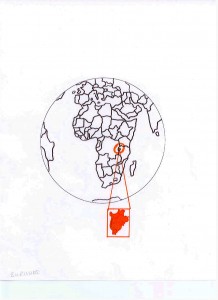BURUNDI
A. THE COUNTRY
The Republic of Burundi is a mountainous, fertile country in the
northeast shore of Lake Tanganijika, with the second highest population
density in Africa. Landlocked and overcoming decades of conflict,
Burundi is highly in debt and heavily dependent on outside aid despite
recent political and economic stability. Following a peace accord that
was signed by every rebel group, the government is became a presidential
democracy that represents both Hutu and Tutsi. Tea and coffee exports
are subject to weather and market fluctuations, and mineral resources
are largely unexploited. Soil erosion is a serious problem due to the
high density population that works the land.
B. THE PEOPLE
The population is ~8,800,000 and official languages Kirundi and French.
Corruption is worsening and bribery all but requisite for transactions
of almost any nature. Young people and children suffered the brunt of
the last decades of upheaval, and some are still victims of violence,
malnourishment, malaria and AIDS.
~98.2% are Kirundi-speaking. There is considerable inter-ethnic mixing.
~1.6% are Other African, and ~0.2% Other (South Asian, European, Arab).
C. RELIGIONS AND CHRISTIANITY/PENTECOSTALISM
~90.46% claim to be Christian, ~5.5% Muslim, ~3.8% Ethnoreligionist,
~0.09% Non-religious, ~0.08% Bahai, ~0.07% Other.
In the Christian category:
~60.92% are Catholic, ~10.59% Independent, ~9.89% Protestant, ~8.49%
Anglican, ~1.3% Unaffiliated, ~0.19% are considered ‘marginal’, ~0.02%
Orthodox.
Evangelicals represent ~27% of the population.
Charismatics represent ~17.4% and of those ~12.2% are Pentecostals.
Donna Siemens
References:
http://en.wikipedia.org
Operation World, Jason Mandryk. Colorado Springs: Biblica Publishing, 2010.

